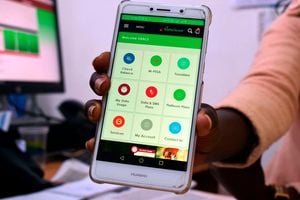
This means that mobile money transfer charges are going up while charges on call, data and SMS charges are going down.
A push to compel Safaricom, Airtel, and Telkom Kenya to split their mobile money services from the telecommunications segment has gained fresh impetus.
This is after the Kenya Information and Communications (Amendment) Bill, 2022 was tabled in Parliament for the second reading on Wednesday this week.
The Bill is seeking to have telcos separate their mobile money services from voice, data, and SMS services, forcing them to apply to the Central Bank of Kenya (CBK) for licenses to operate their mobile money services.
The split would see M-Pesa, Airtel Money, and T-Kash fall under the same ambit as banks, a proposal that has drawn sharp opposition from Safaricom. The firm says that the Bill is retrogressive and hurts innovation.
The second reading is part of a six-phase legislative process in Parliament before a proposal becomes law. “The proposal (splitting mobile money from telecommunications services) is a hindrance to innovation and does not reflect international best practices,” Safaricom said when it appeared before the Communication and Information Committee of Parliament.
At the second reading, MPs will debate the report on the Bill and vote on whether to allow it to move to the committee stage.
All eyes are on how fast MPs will move in debating the Bill and if they will retain the clauses that seek to split mobile money from telecommunications services.
MPs vote to reject or accept individual clauses of the Bill at the Committee stage, then push it to the report stage where further amendments can be proposed.
The Bill then moves to the Third reading which is the last phase where MPs vote to send it to the President for assent into law.
Separation of the services is meant to allow for increased scrutiny of the multi-billion-shilling mobile money market. Safaricom has already revealed that it faces a Sh75 billion tax liability if the push is successful, with the telco pushing for an international reorganisation to avoid paying the taxes.
Early this year, CBK revealed that there was a planned meeting with the Treasury and Safaricom to deliberate on the tax waiver push.
The first push to force telcos to split their mobile money businesses from voice, data, and SMS services was made three years ago through the Kenya Information and Communications (Amendment) Bill, 2021.
MPs, however, snubbed debate on the Bill but it was later re-introduced in November 2022 amid growing concerns that Safaricom has become too big through its dominant market share in voice, mobile data, and mobile money.
Safaricom controls over 95 per cent of the mobile money market, 65.5 per cent of the voice market, 37.4 per cent of the fixed data market, and 89.4 per cent of SMS.






